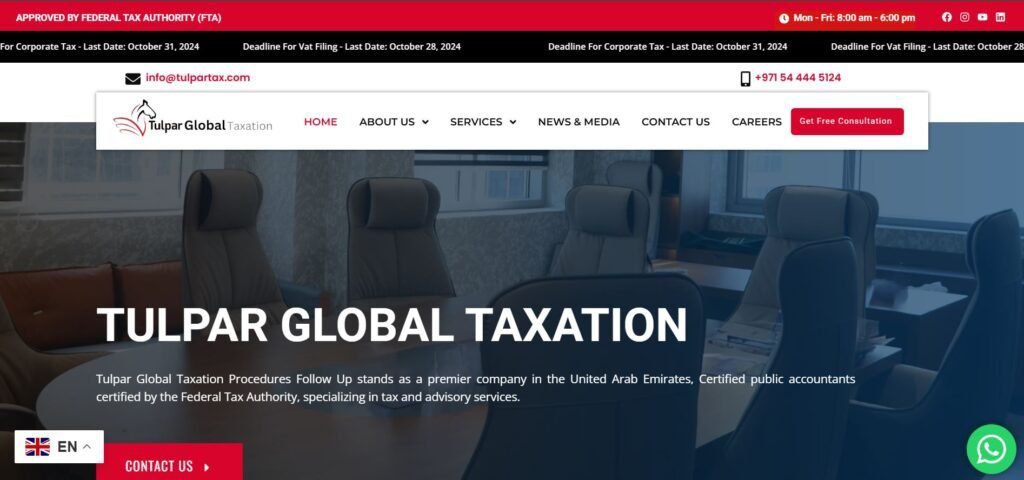
Corporate Tax Filing in UAE - 2026
Ensure seamless Corporate Tax Filing in UAE for 2026 with expert guidance and top software solutions, meeting FTA deadlines and avoiding penalties. Stay compliant with UAE’s 9% corporate tax rate and simplify your tax returns through the EmaraTax portal.
Table of Contents
Related Articles


Excise Product Registration in the UAE – 2026

Sugar Tax Reform Will Crush Small UAE Drink Brands

Let's Talk
Sign Up For Free Consultation
Corporate Tax Returns Filing in Dubai - UAE
Navigating the UAE’s corporate tax landscape can feel like venturing into uncharted territory, especially with the introduction of the federal Corporate Tax (CT) regime on June 1, 2023. For businesses operating in Dubai, Abu Dhabi, Sharjah, or any other emirate, understanding Corporate Tax Filing in UAE is not just a legal obligation, it’s a strategic opportunity to optimize finances and ensure compliance with the Federal Tax Authority (FTA). Whether you’re a startup, an SME, or a multinational corporation, this comprehensive guide by Tulpar Global Taxation will empower you to master CT filing, avoid penalties, and leverage tax benefits for sustainable growth. Let’s dive into everything you need to know to stay compliant and competitive in the UAE’s dynamic market.

Why Corporate Tax Filing in UAE Matters in 2026
The UAE’s corporate tax regime, introduced through Federal Decree-Law No. 47 of 2022, marks a significant shift in the region’s fiscal policies. With a headline tax rate of 9% on taxable profits exceeding AED 375,000, businesses must adapt to new compliance standards and filing requirements. Corporate tax filing is not just about meeting deadlines, it’s about ensuring financial accuracy, minimizing tax liabilities, and positioning your business for long-term success in the UAE’s competitive market.
The Importance of Compliance with FTA Regulations
Compliance with the Federal Tax Authority FTA is non-negotiable. Failure in filing of corporate tax returns or register on time can result in penalties, including a AED 10,000 fine for late registration. The FTA requires all taxable persons, including free zone entities, to register through the EmaraTax portal and file returns within nine months of their financial year-end. For example, businesses with a fiscal year ending December 31, 2024, must file by September 30, 2026. Non-compliance can also lead to audits, legal action, and reputational damage, which can hinder business growth.
Tulpar Global Taxation, a leading tax consultancy in Dubai, specializes in guiding businesses through these requirements. With offices in Dubai, Sharjah, and Ajman, their expert team ensures accurate submissions and timely compliance, helping you avoid costly mistakes. By partnering with professionals like Tulpar, you can focus on growing your business in the UAE, while staying aligned with UAE tax laws.
How Corporate Tax Impacts UAE Businesses
The UAE’s corporate tax applies to all businesses, including mainland companies, free zone entities, and foreign entities with a permanent establishment in the UAE. However, the tax structure offers incentives, such as a 0% rate for profits up to AED 375,000 and exemptions for qualifying free zone persons. Understanding how these rules apply to your business is crucial for optimizing your tax position.
For instance, free zone businesses in areas like DMCC or Jebel Ali Free Zone (JAFZA) may qualify for a 0% tax rate on eligible income, but they must still file a simplified return to confirm their status. Mainland companies, on the other hand, can benefit from exemptions on dividends and capital gains under the Participation Exemption. Tulpar Global Taxation helps businesses navigate these nuances, ensuring they maximize tax benefits while remaining compliant.
The Role of Corporate Tax Filing in Financial Optimization
Corporate tax filing is not just about compliance, it’s a strategic tool for financial optimization. By accurately calculating taxable income, claiming deductions, and leveraging exemptions, businesses can reduce their tax burden and reinvest savings into growth initiatives. For example, the UAE allows deductions for expenses like R&D, interest (up to 30% of EBITDA), and losses carried forward indefinitely (up to 75% of taxable income). Tulpar Global Taxation’s expert consultants provide tailored strategies to optimize these deductions, ensuring your business thrives in the UAE’s tax environment.
Key Steps for Corporate Tax Filing in UAE

Filing corporate tax in the UAE involves a series of steps that require careful planning and execution. From registration to submission, each step is critical to ensuring compliance and avoiding penalties. Below, we outline the essential steps to streamline your CT filing process.
Step 1: Register with the FTA on the EmaraTax Portal
The first step in corporate tax filing is registering with the FTA through the EmaraTax portal to obtain a Tax Registration Number (TRN). This is mandatory for all taxable persons, including free zone companies, regardless of their tax rate. The deadline for registration is June 30, 2026, for businesses operating in 2024, to avoid a AED 10,000 penalty.
Tulpar Global Taxation simplifies this process by guiding businesses through the EmaraTax portal, ensuring accurate submissions and timely registration. Their team verifies your business’s eligibility for exemptions, such as the 0% rate for qualifying free zone persons, and ensures all required documents are in order.
Step 2: Gather and Organize Financial Records
Accurate financial records are the backbone of corporate tax filing. Businesses must maintain detailed records of income, expenses, assets, and liabilities for at least seven years, as mandated by the FTA. Key documents include:
Financial statements (balance sheet, profit and loss, cash flow)
Bank statements and reconciliation reports
Invoices, receipts, and expense records
Tax filings and returns
Tulpar Global Taxation’s experienced accountants help businesses organize these documents, ensuring they meet FTA standards. Their comprehensive approach minimizes errors and prepares you for potential audits, giving you peace of mind.
Step 3: Calculate Taxable Income
Calculating taxable income is a critical step in corporate tax filing. The UAE’s corporate tax applies to profits exceeding AED 375,000 at a 9% rate, with a 0% rate for profits below this threshold. Businesses must account for:
Revenue from all sources, including foreign income
Deductible expenses, such as R&D, interest, and operational costs
Exemptions, such as dividends, capital gains, and intra-group transactions
Tulpar Global Taxation’s tax consultants use advanced tools to accurately calculate taxable income, ensuring compliance with arm’s length principles and transfer pricing regulations. Their expertise helps businesses claim all eligible deductions, reducing their tax liability.
Step 4: Submit the Tax Return and Pay Taxes
Tax returns must be filed within nine months of the financial year-end via the EmaraTax portal. For example, a business with a fiscal year ending June 30, 2024, must file by March 31, 2026. Any taxes due must be paid by the same deadline. Extensions can be requested within 30 days for valid reasons, but timely filing is crucial to avoid penalties.
Tulpar Global Taxation’s proactive deadline tracking and compliance support ensure businesses meet these deadlines. Their team handles the entire filing process, from preparing the return to making payments, allowing you to focus on your core operations.
Understanding Corporate Tax Rates and Exemptions
The UAE’s corporate tax regime is designed to be competitive and business-friendly, with a low headline rate of 9% and several exemptions. Understanding these rates and exemptions is essential for effective tax planning and compliance.
Corporate Tax Rates in the UAE
The UAE’s corporate tax rates are straightforward:
0% on taxable profits up to AED 375,000
9% on taxable profits exceeding AED 375,000
0% for qualifying free zone persons on eligible income
These rates make the UAE one of the most tax-competitive jurisdictions globally. However, businesses must accurately calculate their taxable income to determine their tax liability. Tulpar Global Taxation’s expert consultants ensure precise calculations, helping businesses optimize their tax position.
Exemptions and Incentives
The UAE offers several exemptions to reduce the tax burden:
Participation Exemption: Dividends and capital gains from qualifying shareholdings are exempt from corporate tax.
Qualifying Free Zone Persons: Free zone businesses meeting specific criteria enjoy a 0% tax rate on eligible income.
Intra-Group Transactions: Qualifying intra-group transactions and reorganizations are exempt, provided conditions are met.
R&D Incentives: Full deductibility of R&D expenses and a planned 30%-50% R&D tax credit from 2026 encourage innovation.
Tulpar Global Taxation helps businesses leverage these exemptions, ensuring they meet all eligibility criteria and maintain compliance with FTA regulations.
Special Considerations for Free Zone Businesses
Free zone businesses, such as those in DMCC or JAFZA, must register for corporate tax and file returns, even if they qualify for a 0% rate. Missteps in filing or misunderstanding exemption criteria can lead to audits or penalties. Tulpar Global Taxation’s deep expertise in free zone tax frameworks ensures accurate filings and compliance, helping businesses maintain their tax benefits.
Common Challenges in Corporate Tax Filing and How to Overcome Them
Corporate tax filing in the UAE can be complex, especially for businesses navigating the new regime. Below, we explore common challenges and how to address them with the help of Tulpar Global Taxation.
Navigating Complex Corporate Tax Laws
The UAE’s corporate tax laws, including transfer pricing and arm’s length principles, can be daunting. Businesses must ensure their transactions meet these standards to avoid adjustments or penalties. Tulpar Global Taxation’s expert team provides clear guidance on these regulations, ensuring compliance and minimizing risks.
Meeting Filing Deadlines
Missing the June 30, 2026, registration deadline or the nine-month filing deadline can result in hefty fines. Tulpar Global Taxation offers proactive deadline tracking and compliance support, using FTA alerts and task management tools to keep businesses on track.
Avoiding Penalties and Audits
Errors in tax returns or failure to maintain records can trigger audits or penalties. Tulpar Global Taxation’s comprehensive approach to record-keeping and filing ensures accuracy, reducing the risk of audits and helping businesses avoid penalties like the AED 10,000 late registration fine.
The Role of Professional Tax Consultants in Corporate Tax Filing

Partnering with a professional tax consultant like Tulpar Global Taxation can make all the difference in navigating the UAE’s corporate tax regime. Their expertise ensures compliance, optimizes tax strategies, and saves time and costs.
Why Choose Tulpar Global Taxation?
Tulpar Global Taxation stands out as a leading tax consultancy in the UAE, with offices in Dubai, Sharjah, and Ajman. Their services include:
Expert Guidance: Certified tax consultants with deep knowledge of UAE tax laws.
Tailored Solutions: Customized strategies for startups, SMEs, and multinationals.
Comprehensive Support: From registration to filing, auditing, and tax planning.
Proven Success: A track record of helping businesses achieve compliance and financial efficiency.
By choosing Tulpar, businesses gain a trusted partner dedicated to their success in the UAE’s tax landscape.
Benefits of Hiring a Tax Consultant
Hiring a tax consultant offers several benefits:
Cost Savings: Optimize deductions and exemptions to reduce tax liabilities.
Time Efficiency: Streamline the filing process, freeing up time for core operations.
Compliance Assurance: Ensure adherence to FTA regulations, avoiding penalties.
Strategic Planning: Leverage tax incentives for long-term financial growth.
Tulpar Global Taxation’s personalized approach ensures businesses receive the support they need to thrive.
UAE Corporate Tax Filing Deadlines Demystified
Meeting deadlines is crucial for corporate tax compliance in the UAE. The Federal Tax Authority (FTA) imposes strict timelines, and missing them can lead to significant fines or legal complications. By planning ahead and staying organized throughout the financial year, businesses can ensure smooth filing, avoid penalties, and maintain a solid compliance record. Setting reminders and aligning with your accountant or tax advisor early can make a big difference.
UAE CT Filing Deadlines 2026 at a Glance
- June 30, 2026: For September 30, 2024, year-ends.
- September 30, 2026: For December 31, 2024, year-ends.
- Extensions: Request within 30 days for valid reasons.
Stay Ahead with Deadline Tracking Tips
Keeping track of corporate tax filing deadline 2026, is key to avoiding last-minute stress and penalties. Leverage FTA alerts, set up calendar reminders, or use task management tools to stay organized. Better yet, partner with experts like Tulpar Global Taxation, who offer proactive tracking of deadline for filing and full compliance support. With the right system in place, you’ll never miss a filing date and you’ll always stay one step ahead.
Free Zone Corporate Tax Filing: Navigate Exemptions with Ease
Free zone businesses in areas like DMCC or Jebel Ali Free Zone (JAFZA) benefit from unique corporate tax regulations and in many cases, a 0% tax rate. However, this doesn’t mean they’re free from compliance obligations. Misunderstandings or filing errors can trigger audits or penalties. That’s where Tulpar Global Taxation steps in. With deep expertise in free zone tax frameworks, Tulpar helps both SMEs and multinational companies navigate compliance confidently, optimize tax positions, and enjoy peace of mind.
Are Free Zone Businesses Exempt from Corporate Tax?
Yes, but with conditions. Many free zone businesses in the UAE can benefit from a 0% corporate tax rate, provided they meet specific criteria set by the Federal Tax Authority (FTA). This usually includes maintaining adequate substance in the free zone, earning only qualifying income, and complying with all regulatory and filing obligations. It’s not automatic, and non-compliance can lead to losing the tax exemption. That’s why working with experts like Tulpar Global Taxation is key, they ensure your business stays within the FTA’s framework and continues to enjoy the benefits legally and efficiently.
How Free Zone Businesses File Corporate Tax CT?
Filing corporate tax as a free zone business begins with verifying your exemption status with the Federal Tax Authority (FTA). If your business qualifies for the 0% tax rate, you’ll still need to file a simplified return to confirm your status. However, if any portion of your income is taxable — for example, from mainland activities — a full corporate tax return is required. It’s essential to track all transactions and income sources accurately to avoid mistakes that could lead to audits or loss of exemption. Partnering with professionals like Tulpar Global Taxation ensures your filing is accurate, timely, and fully compliant with FTA guidelines.
Why Choose Tulpar Global Taxation for Corporate Tax Filing?

Selecting the right partner for corporate tax filing services in UAE is critical to achieving compliance and optimizing your tax strategy. Tulpar Global Taxation, a leading VAT and tax consultancy with offices in Dubai, Sharjah, and Ajman, offers unparalleled expertise and tailored solutions for businesses of all sizes.
Comprehensive Tax Advisory Services
Tulpar Global Taxation provides end-to-end tax solutions, including:
- VAT and Corporate Tax Integration: Seamless management of both VAT and corporate tax obligations, ensuring consistency and compliance.
- FTA Registration Support: Assistance with registration, deregistration, and TRN issuance, streamlining the process.
- Tax Planning: Strategies to minimize liabilities through deductions, exemptions, and incentives.
- Audit Support: Preparation and representation during FTA audits to resolve issues quickly.
Their team stays updated on regulatory changes, ensuring your business complies with the latest FTA guidelines.
Tailored Solutions for All Business Sizes
Tulpar Global Taxation customizes its services to meet the needs of diverse businesses:
- Startups: Cost-effective filing and advisory services for new businesses with limited budgets. For example, a startup with minimal profits can benefit from affordable compliance packages.
- SMEs: Streamlined processes to reduce administrative burdens, allowing small teams to focus on growth.
- Multinationals: Advanced strategies like tax grouping, transfer pricing, and international tax compliance for complex structures.
Their client-centric approach ensures every business receives personalized support tailored to its unique needs.
Proven Expertise and Local Knowledge
With a presence in Dubai, Sharjah, and Ajman, Tulpar Global Taxation combines global tax expertise with deep knowledge of UAE regulations. Their team of certified tax consultants has a proven track record of helping businesses navigate the UAE’s evolving tax landscape, from free zone exemptions to mainland compliance. For instance, they’ve helped numerous free zone companies secure tax exemptions by ensuring compliance with substance requirements.
By choosing Tulpar Global Taxation, you gain a trusted partner dedicated to your business’s success. They offer expert guidance on tax period compliance and provide public clarification on complex tax matters. Contact Now to learn more about their services and schedule a consultation.
The Future of Corporate Tax in UAE: What to Expect in 2026 and Beyond
As the UAE aligns with global tax standards, businesses must prepare for future changes in corporate tax filing Dubai – UAE. Here are the trends and predictions for 2026 and beyond, ensuring your business stays ahead of the curve.
Stricter Compliance and Penalties
The FTA is increasing scrutiny on non-compliance, with more frequent audits and higher penalties. In 2026, businesses can expect:
- Increased Audits: The FTA may target high-risk sectors like real estate, trading, and hospitality for audits.
- Higher Penalties: Fines for late filings or errors could increase to deter non-compliance.
- Enhanced Monitoring: Advance tools will flag discrepancies, such as inconsistent VAT and corporate tax filings.
To prepare:
- Conduct Internal Audits: Review financial records quarterly to identify and correct discrepancies.
- Engage Experts: Tulpar Global Taxation conducts compliance audits to mitigate risks and prepare for FTA inspections.
- Document Everything: Maintain detailed records of transactions, expenses, and exemptions to support your filings during audits.
Global Tax Alignment
The UAE is adopting OECD guidelines, such as Pillar Two, to ensure fair taxation for multinationals. This may impact:
- Transfer Pricing: Stricter documentation requirements for intra-group transactions to prevent profit shifting.
- Global Reporting: Enhanced reporting for multinational entities with UAE operations, including Country-by-Country Reporting (CbCR).
- Minimum Tax Rates: Pillar Two introduces a 15% minimum tax for large multinationals, which could affect UAE-based subsidiaries.
Tulpar Global Taxation specializes in international tax compliance, helping businesses navigate OECD guidelines, transfer pricing, and global reporting requirements.
Emerging Tax Incentives
The UAE is likely to introduce new tax incentives in 2026 to support economic diversification and sustainability. Potential incentives include:
- Technology and Innovation: Tax credits for businesses investing in AI, blockchain, or fintech solutions.
- Sustainability: Relief for companies adopting renewable energy or eco-friendly practices.
- SME Support: Expanded exemptions or reduced rates for startups and small businesses to encourage growth.
Tulpar Global Taxation stays ahead of these trends, helping businesses identify and apply for new incentives to reduce their tax burden.
Corporate tax filing in the UAE is a critical process that requires precision, expertise, and strategic planning. By understanding the requirements, leveraging exemptions, and partnering with professionals like Tulpar Global Taxation, businesses can ensure compliance, avoid penalties, and optimize their tax position. With the June 30, 2026, registration deadline approaching, now is the time to act. Contact Tulpar Global Taxation at their Dubai, Sharjah, or Ajman offices or visit tulpartax.com to streamline your CT filing and position your business for success in 2026 and beyond.
Take Control of Your Corporate Tax Filing
Navigating corporate tax filing in UAE in 2026 requires expertise, strategic planning, and a proactive approach. By understanding the tax system, following a structured filing process, leveraging deductions and exemptions, and staying ahead of regulatory changes, your business can achieve compliance and maximize savings. Tulpar Global Taxation, with its comprehensive VAT and tax consultancy services in UAE, is your trusted partner in this journey. From FTA registration to advanced tax planning, their team ensures your business thrives in the UAE’s dynamic tax landscape.
Ready to streamline your corporate tax filing? Contact Tulpar Global Taxation at their Dubai, Sharjah, or Ajman offices, or visit tulpartax.com for expert VAT and tax solutions tailored to your business needs. Take control of your tax obligations today and position your business for success in 2026 and beyond.
FAQs:
Yes. All businesses within the scope of UAE Corporate Tax must file a Corporate Tax return in 2026, even if no tax is payable. Filing is a legal requirement under UAE tax law. Tulpar Global Taxation ensures businesses meet all filing obligations on time.
Mainland companies, Free Zone companies, foreign branches, and qualifying individuals conducting business must file returns if registered. Even 0% tax entities are required to submit returns. Tulpar Global Taxation helps determine filing requirements accurately.
The UAE Corporate Tax rate remains 0% on taxable income up to AED 375,000 and 9% on income exceeding this threshold. Large multinational groups may also fall under the 15% global minimum tax. Tulpar Global Taxation advises on correct rate application.
Corporate Tax returns must generally be filed within 9 months from the end of the financial year. Late filing can result in penalties. Tulpar Global Taxation tracks deadlines and manages timely submissions.
Yes. All Free Zone companies must file Corporate Tax returns, regardless of whether they qualify for the 0% regime. Failure to file may result in penalties or loss of tax benefits. Tulpar Global Taxation ensures Free Zone compliance and QFZP assessments.
Required documents typically include audited financial statements, trial balance, tax adjustments, and supporting schedules. Proper documentation reduces audit risk. Tulpar Global Taxation prepares audit-ready filing packs.
Yes. Businesses must register with the Federal Tax Authority (FTA) before filing a Corporate Tax return. Late registration may trigger penalties. Tulpar Global Taxation manages registration and portal compliance.
Yes, errors can be corrected through amendments or voluntary disclosures on the FTA portal. Early correction helps reduce penalties. Tulpar Global Taxation assists with revisions and compliance corrections.
Penalties may apply for late registration, late filing, incorrect returns, or poor record-keeping. Enforcement is expected to be stricter in 2026. Tulpar Global Taxation helps businesses avoid penalties through proactive compliance.
Tulpar Global Taxation provides end-to-end Corporate Tax services, registration, calculation, filing, audits, and FTA representation. Their structured and compliant approach reduces risk and complexity. This makes them a trusted Corporate Tax partner in the UAE for 2026.
